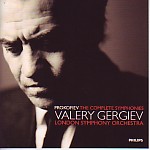It’s rather amazing just how many bad Prokofiev symphony cycles there have been; happily this isn’t one of them. The absolute nadir remains Ozawa/Berlin on DG, while the best is Järvi’s on Chandos, followed by Kuchar on Naxos. Weller’s Decca cycle also has its moments, and this one probably stands close to Kuchar, while not quite reaching Järvi’s level of sonic and interpretive distinction. But it’s very good, due in no small degree to the fact that Philips wisely opted to use the LSO rather than Gergiev’s own Kirov band, a second-rate ensemble that the label seldom has managed to record well. The dry acoustics of the Barbican, where these performances were recorded live, aren’t exactly ideal, being particularly unkind to the woodwind section, but the results here are at least respectable, and the superiority of the orchestral execution speaks for itself.
The outstanding performance here is of Symphony No. 6, a tough nut to crack and one to which Gergiev brings tremendous fire and conviction. Given that on balance this is the composer’s finest symphony, this is no small achievement. In the first movement Gergiev does a splendid job underlining the sense of menace through threatening interjections from the low brass and bass drum, while the central andante has both passion and (unusually) real structural coherence. Gergiev and the orchestra attack the finale for all they’re worth, bringing the work to a terrifying conclusion. The performance of the Fifth Symphony isn’t on quite such a level, mostly due to Gergiev’s tendency to rush, particularly the first-movement coda and parts of the finale. Still, it’s a good account of a symphony that’s often played very poorly–and it’s much better than the one I saw Gergiev do live with the Kirov orchestra.
This account of the “Classical” Symphony proves disappointing, however. Of course the orchestra knows it well, as it does most of this music (having made excellent recordings with, among others, Previn and Weller), but Gergiev’s handling of the first movement is labored, and the finale is so quick as to preclude clean articulation. Pity the flutes, who are audibly suffering. As for the remainder, Gergiev catches the lyrical sweetness and innocence of the Seventh quite well (keeping the original, quiet ending). Symphonies 2 and 3 have the necessary energy and edge, particularly the latter, if without quite the sonic glamour of Muti or Chailly. You also get both versions of No. 4, always a curiosity as no one much cares for the piece either way (though I happen to like the first version quite a bit, and this is another very good performance). So, although not perfect, this is a solid, recommendable set, particularly for Symphonies Nos. 2-4, 6, and 7.
































